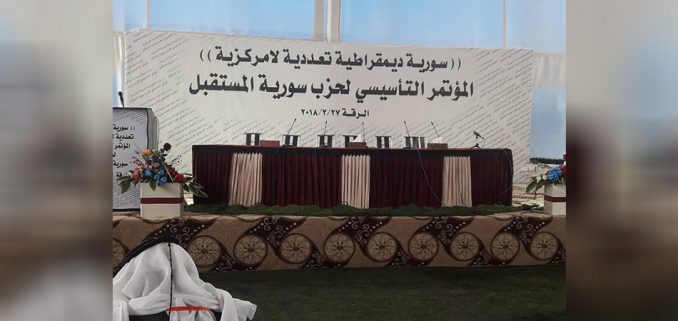The Germany DPA news agency quoted sources from the Syrian Democratic Forces militia as saying that it would announced on Tuesday the launch of a new political formation under the name Syria’s Future Party.
Local sources said that the “foundational conference” had begun active work in the city of Raqqa, where an image from the conference hall showed the party’s official slogan: “Democratic, pluralistic, decentralized Syria.”
Local sources said that the party would be an extension of the Kurdish Democratic Union Party, with Arab, Turkmen and Syriac members entered into its ranks, and that about 700 political, social and media figures from Raqqa, Deir-ez-Zor, Hassakeh and Aleppo provinces attended its foundational conference.
The head of the Association of Independent Kurds, Abdel Aziz al-Tamou, told Jiroun that “the Syria’s Future Party comes at American instruction to the leaders oft he Democratic Union Party [PYD] and the Syrian Democratic Forces militia, whereby the Americans required that the name be changed and all previous slogans removed in order to continue support, in order to avoid provoking Turkey. This step will be followed by the launch of other Arab parties in the eastern provinces, and then elections will be held to form an administration for the area under American influence.”
Tamou ruled out that there would be “a change in the behavior and methods of the SDF militia after changing its name, because Ocalan’s philosophy and the Qandil leaders are still in control of everything. This step resembles the Nusra Front changing its name a number of times to deny its connection to Al-Qaeda.”
Tamou said that “this step comes in preparation for future American agreements with the Turks with regards to the area east of the Euphrates.”
These developments come after successive Turkish threats recently regarding Ankara’s intention to enter Manbij, Tel Abyad, Ayn al-Arab, Ras al-Ayn and Qamishli, with the aim of expelling the SDF because of its open and direct connection with the Kurdistan Workers’ Party, classified as a terrorist group in Turkey.
From another side, Bassam al-Qowtli, from the Working Group for Syria, told Jiroun that “the step of changing the name of the PYD to the Syria’s Future Party is unimportant, because we believe that changing names will not change much in public opinion. The most important question is: Is there a change in the ideas and policies? Will this party be loyal in its ideas to Ocalan and will the Turkish and Iranian leaders who have come from Qandil remain? Or will they leave Syria and leave conducting affairs to the Syrians?”
Qowtli added: “We ask a number of questions here: Will this party accept democracy and apply it, or will it take power? Will it remain in control of political action and prevent others from practicing it? This is an important issue to understand this step. Changing the name has no value. It could indicate a desire to change, but is this the result of American desire or conviction, as happened previously, when it took the name SDF? I think that it is too early to answer these questions and that we need to wait to see the coming days.”
The Americans are currently trying to secure areas of their influence east of the Euphrates in Hassakeh, Raqqa and Deir-ez-Zor after expelling the Islamic State (ISIS) organization through issuing a number of statements around reconstruction and the return of refugees.
However, it seems that this requires political administration which is able to achieve local agreement and international acceptance.
But Washington so far is not able to make its decision yet, as Qawtli indicated: “The Americans have not yet specified their choice with regards to the form of the administration east of the Euphrates, and it actively needs a force to stand with it regardless of its form. Previously the Americans worked with the Taliban in Afghanistan despite their form – what is important for the Americans is marketing the issue internationally, especially with Europe and Turkey. The Syrian people can influence, through pressure, a real change in this administration.”
From another side, M.M., a teacher from the city of Manbij, said: “I can say that these performances have become trivial. I do not believe there is any value to this change. After seeing the real face of the SDF and its foreign project, one cannot expect a national project from them.”
He continued: “Before the SDF talks about the future, we need to inform more than 100,000 displaced people from Arab villages east of the Euphrates about their future after they were expelled from their homes!”
This article was translated and edited by The Syrian Observer. Responsibility for the information and views set out in this article lies entirely with the author.


